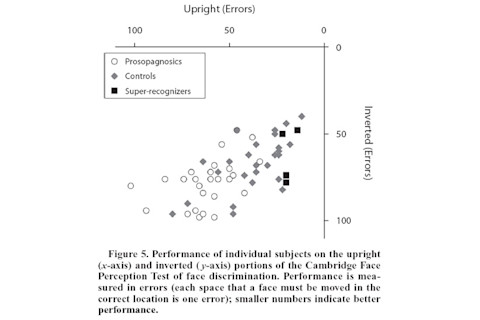A few years ago I commented a fair amount on the topic of prosopagnosia, face blindness. Turns out that ~2% of the population can't really recognize faces, and this is a cryptic trait as many of these individuals have developed compensatory tendencies so that people don't know. Not only that, but there seems to be a strong genetic component so that it runs in families. At the time I was fascinated by this because it made me wonder at how much more "cryptic" variation there could be in the human population. It seems that face recognition is such a basic and universal "competency" that it is hard to fathom that 1 out of 50 humans would lack the capability. Now the same team has come out with new research reporting that there are individuals at the other end, those who are extremely good at recognizing and remembering faces. Super-recognizers: People with extraordinary face recognition ability:
We tested 4 people who claimed to have significantly better than ordinary face recognition ability. Exceptional ability was confirmed in each case. On two very different tests of face recognition, all 4 experimental subjects performed beyond the range of control subject performance. They also scored significantly better than average on a perceptual discrimination test with faces. This effect was larger with upright than with inverted faces, and the 4 subjects showed a larger "inversion effect" than did control subjects, who in turn showed a larger inversion effect than did developmental prosopagnosics. This result indicates an association between face recognition ability and the magnitude of the inversion effect. Overall, these "super-recognizers" are about as good at face recognition and perception as developmental prosopagnosics are bad. Our findings demonstrate the existence of people with exceptionally good face recognition ability and show that the range of face recognition and face perception ability is wider than has been previously acknowledged.
Here's a figure showing how the three categories relate to each other:

Here's an elaboration from the discussion:
Most developmental prosopagnosics we have tested in our laboratories score around 2-3 SDs below normal on the CFMT short form. In comparison, 3 super-recognizers scored around 2 SDs above the mean on the CFMT long form. Similarly, on the CFPT, effect sizes were very similar for the comparisons between prosopagnosics and controls, and between super-recognizers and controls. In both face recognition and face perception, the super-recognizers are about as good as many developmental prosopagnosics are bad. This suggests that many cases of developmental prosopagnosia may represent the low end of normal face recognition ability rather than a qualitatively different kind of face processing.
In ScienceDaily they say:
Russell theorizes that super-recognizers and those with face-blindness may only be distinguishable today because our communities differ from how they existed thousands of years ago. "Until recently, most humans lived in much smaller communities, with many fewer people interacting on a regular basis within a group," says Russell. "It may be a fairly new phenomenon that there's even a need to recognize large numbers of people."
Ah, good point. But here's the thing: this sort of ability almost certainly likely tracks other abilities. Traits which exhibit a lot of normal variation, along the Bell Curve, usually don't have strong fitness implications across their states. That is, if the trait has very low fitness in a particular state that state is purged. The variation is probably due then to other factors, from drift to the G-matrix. In any case, some of the anecdotes these people tell about their inability to never forget a face are straight out of science fiction. Though I'm not sure if remembering everyone is actually that convenient, it seems like a form of mental clutter. But what do I know? I'm a neurotypical on this trait.













